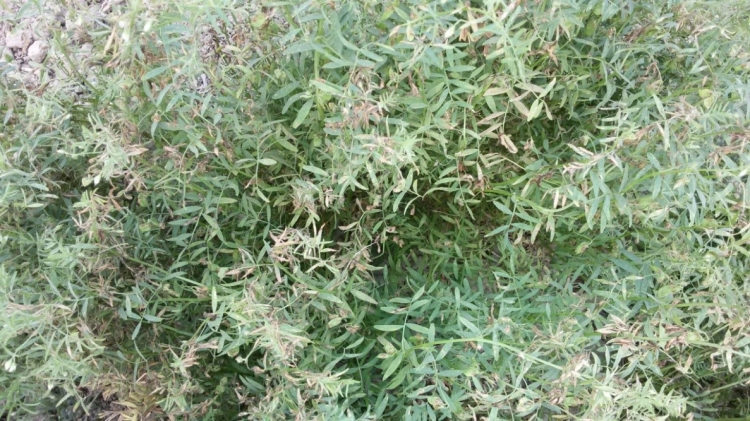
Stemphylium blight in lentil. (Photo: Shiv Agrawal, International Centre for Agricultural Research in the Dry Areas (ICARDA))
In this CRP, mutation induction and associated genomics technologies will be used for productivity improvement of three pulses, namely, chickpea, cowpea and lentil, which together account for 40% of global pulses’ production. The research focus is on enhancing the tolerances of: (1) chickpea to the pod borer, Helicoverpa armigera; (2) cowpea to the bod borer, Maruca vitrata, and (3) lentil to the disease, Stemphylium blight. Towards this end, the CRP, with the expected participation of the National Agricultural Research System of countries where the crops are grown extensively, shall over a period of four to five years, generate mutant populations, including advanced lines, and develop, validate and publish genotyping and phenotyping protocols.
Mutation induction is an established means to generate heritable variation in crops and therefore holds great promise to diversify further the genetic base of pulses, enhancing their adaptation to the pressures induced by the effects of climate change, especially the frequent emergence of new biotypes and strains of pests and diseases. The Mutant Variety Database of the IAEA identifies 23, 18 and 13 varieties, respectively, of chickpea, lentil and cowpea, released from past efforts in mutation breeding using irradiation (gamma rays) and chemical (EMS) mutations.
CRP Overall Objective
This CRP aims to develop genetic resources through induced mutations and associated genomic tools for accelerated adaptation of pulses-based cropping systems to climate change.
Specific Research Objectives
- To generate genetic diversity in chickpea, cowpea and lentil through mutagenesis for resistance to Helicoverpa armigera, Maruca vitrata and Stemphylium botryosum, respectively.
- To develop and/or refine phenotyping tools to facilitate precise (confident) and efficient selection of biotic-stress resistance in selected pulse crops.
- To develop genomic tools for accelerated variety development for the selected pulse crops and associated traits of interest.
Outputs
- Mutant population(s) generated for chickpea, cowpea and lentil.
- Phenotyping tools developed for the identification of resistant germplasm.
- Improved lines identified for traits of interest.
- Molecular markers and associated protocols developed for variety development/improvement.
- Scientific publications produced.
- Protocols and training manuals developed and disseminated.
How to join this CRP
Up to seven research contracts are expected to be awarded together with up to five no-cost agreement holders from advanced laboratories. Research institutes with recognized expertise in the targeted technologies will be invited to share their experience with the contract holders and contribute to the development and validation of the planned technical packages. In addition, up to three technical contracts will be awarded for services in advanced areas such as marker development and mutant characterization. Coordination and technical management will be handled by the scientific secretary in the IAEA’s Plant Breeding and Genetics Section with involvement of Plant Breeding and Genetics Laboratory.
Please submit your Proposal for Research Contract or Agreement by email, no later than 30 Apr 2019, to the IAEA’s Research Contracts Administration Section, using the appropriate template on the CRA web portal. Note that the same form can be used for the research contract and technical contract.
For further information related to this CRP, potential applicants should use the contact form under the CRP page.



